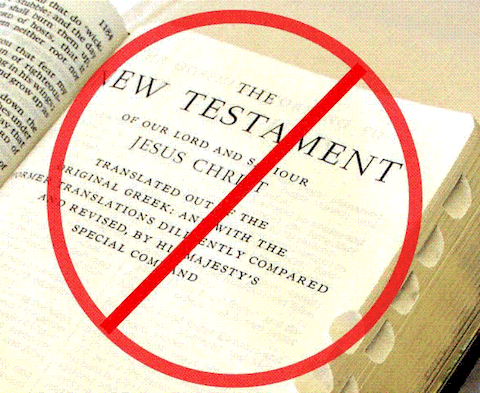
1001 Errors in the Christian Bible
Home
Dedication
Matthew
Mark
Luke
John
Acts
Contact Us
Luke -- Errors 418-424
#418
Luke 21: (KJV)
5 “And as some spake of the temple, how it was adorned with goodly
stones and gifts, he said,
6 As for these things which ye behold, the days will come, in the which
there shall not be left one stone upon another, that shall not be thrown
down.
7 And they asked him, saying, Master, but when shall these things be?
and what sign will there be when these things shall come to pass?”
Compare to Mark 13: (KJV)
1 “And as he went out of the temple, one of his disciples saith
unto him, Master, see what manner of stones and what buildings are here!
2 And Jesus answering said unto him, Seest thou these great buildings?
there shall not be left one stone upon another, that shall not be thrown
down.
3 And as he sat upon the mount of Olives over against the temple, Peter
and James and John and Andrew asked him privately,”
The author of “Luke” uses the Greek word for “Master”
above that he generally uses for the speech of non disciples so the implication
in Luke is that non-disciples are asking Jesus the question. Mark explicitly
states that disciples asked the question.
# 419
Luke 21: (KJV)
7 “And they asked him, saying, Master, but when shall these things
be? and what sign will there be when these things shall come to pass?”
As what preceded this referred to the destruction of the Temple, the context
indicates that the translation of the Greek should be “when shall
this thing be” (singular). Most modern Christian translations mistranslate
same as KJV because what directly follows refers to “things”.
# 420
Luke 21: (KJV)
7 “And they asked him, saying, Master, but when shall these things
be? and what sign will there be when these things shall come to pass?”
As what preceded this referred to the destruction of the Temple, the context
indicates that the translation of the Greek should be “when this
thing shall come to pass” (singular). Most modern Christian translations
mistranslate same as KJV because what directly follows refers to “things”.
# 421
Luke 21: (KJV)
20 “And when ye shall see Jerusalem compassed with armies, then
know that the desolation thereof is nigh.”
Compare to Mark 13: (KJV)
14 “But when ye shall see the abomination of desolation, spoken
of by Daniel the prophet, standing where it ought not, (let him that readeth
understand,) then let them that be in Judaea flee to the mountains:”
According to Luke the key sign (at least in this part of the story) is
Jerusalem surrounded by armies while in Mark the key sign is the abomination
of desolation which was generally understood to mean something unclean
in the Temple. Let’s see, Jesus was in the Temple teaching changes
to the Law. Was that that some kind of sign to the Jews?
# 422
Luke 21: (KJV)
21 “…and let them which are in the midst of it depart out;
and let not them that are in the countries enter thereinto.”
Compare to Mark 13: (KJV)
15 “And let him that is on the housetop not go down into the house,
neither enter therein, to take any thing out of his house:
16 And let him that is in the field not turn back again for to take up
his garment.”
Compare to Matthew 24: (KJV)
17 “Let him which is on the housetop not come down to take any
thing out of his house:
18 Neither let him which is in the field return back to take his clothes.”
.
Note that “Matthew” has stayed true to his Markan source while
“Luke” has changed the wording to emphasize the big picture
(get out of Jerusalem). Interesting that 2,000 years after this sign was
supposed to have been given to some hearers of Jesus to get out of Jerusalem
most Christians have already gotten out of Jerusalem which is now largely
populated by people who don’t believe in Jesus. I don’t believe
the Gospel Jesuses made any prophecies dealing with this change of events.
# 423
Luke 21: (KJV)
22 “For these be the days of vengeance, that all things which
are written may be fulfilled.”
False prophecy. This sentence is interesting though in that the author
of Luke is referring mainly to the destruction of the Temple but wrote
after the destruction of the Temple and therefore knew that not all things
written were fulfilled. So either the author of Luke knew what she wrote
wasn’t true or whatever was originally written was changed.
# 424
Luke 21: (KJV)
24 “And they shall fall by the edge of the sword, and shall be
led away captive into all nations: and Jerusalem shall be trodden down
of the Gentiles, until the times of the Gentiles be fulfilled.”
Compare to Mark 13: (KJV)
19 “For in those days shall be affliction, such as was not from
the beginning of the creation which God created unto this time, neither
shall be.
20 And except that the Lord had shortened those days, no flesh should
be saved: but for the elect's sake, whom he hath chosen, he hath shortened
the days.”
Same spot in the narrative but different speeches. Luke says “times
of the Gentiles”. Think Luke was Gentile? Jerusalem’s not currently
trodded down by Gentiles. Luukee! Ya got sum splainin ta do!